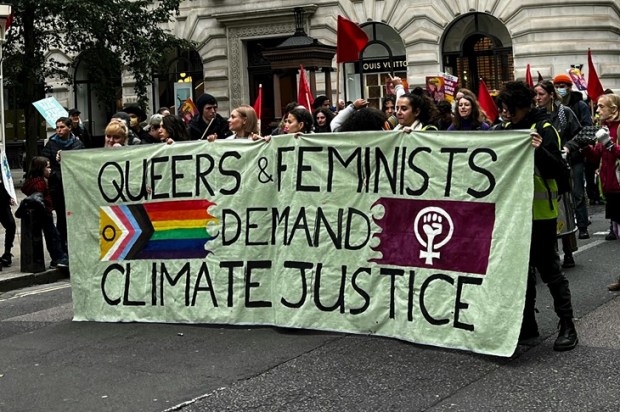 It has long been obvious that the political agenda of some Catholic organisations and schools rest solidly within the Green-left advocacy model, particularly in its increasing reliance on identity politics. Noel Pearson has rightly highlighted the soft bigotry of many of these groups when he notes: “they need blacks to remain alienated from mothers bosoms, incarcerated in legions, leading short lives of grief and tribulation – because if it were not so against whom would they direct their soft bigotry of low expectations.”
It has long been obvious that the political agenda of some Catholic organisations and schools rest solidly within the Green-left advocacy model, particularly in its increasing reliance on identity politics. Noel Pearson has rightly highlighted the soft bigotry of many of these groups when he notes: “they need blacks to remain alienated from mothers bosoms, incarcerated in legions, leading short lives of grief and tribulation – because if it were not so against whom would they direct their soft bigotry of low expectations.”
Nevertheless, it is fundamentally against the interest of the Catholic Church which seeks to speak to all Australians, to allow this feigned victimhood to take root within its primary school educational system. Just this month, grade five students from St James Primary in well-heeled Brighton, Victoria, have been encouraged to write “persuasive letters to their local member in response to the challenges on Nauru and Manus Island. The letters were an attempt to present a child’s view on the detention issue and draw to the attention the concerns of our future Goldstein constituents. They will be voters in 6/7 years”, writes the principal in the school newsletter.
When we have Catholic principals and teachers recruiting activists at ten years of age, it is time to ask serious questions on the suitability of such potentially biased educational offerings. To claim this activity as “reflection and critical thinking” is educational vandalism remarkably similar to the educational offerings that have befallen Cuba and North Korea. Naturally, all this is acclaimed as part of the umbrella of diversity, with one exception: diversity of opinion!
The St Vincent de Paul Society has also been drawn sharply to the left of politics under its CEO John Falzon. The perpetuation of low expectations for indigenous Australians is clearly evident in the opinions of the CEO when he wrote in Perth’s Catholic newspaper, The Record: “There is a deep wound in Australia, it is a wound that is known by different names, colonisation, dispossession, coercion, control … It is still with us. The policies that the government enshrines as legislation are policies built on the falsehood that the wound does not exist … They are policies that continue to harm, to hurt, to humiliate, to degrade, to punish, to control, like all forms of colonisation, they deny the full humanity of those who are subject to them.”
This negative view of indigenous Australians as oppressed and continually held captive by colonial masters is a viewpoint that allows for little creativity or future solutions. Here is just another organisation that in Pearson’s terms encourages “low expectations”; indeed this reliance on alleged oppression encourages no expectations, apart from ever-more taxpayer funded entitlements.
Marcia Langton, the foundational chair for Indigenous Studies at the University of Melbourne could well be talking directly about the attitudes of the St Vincent de Paul Society when she wrote in The Monthly last May: “Aboriginal leaders face the very difficult problem of trying to shift recalcitrant people from welfare to work. What solutions do the Greens and inner-city progressives have, apart from arrogantly and heartlessly accusing these leaders of being assimilationist. The simple answer is none.”
It is time that some Catholic organisations moved beyond the politics of “identity”. A world view that paints some groups as belonging within an oppressed category and others as belonging to the evil oppressors only encourages demands for more help and entitlements from government and enshrines permanent failure. Fortunately, many indigenous Australians and refugees advocates now realise the perversity of those secretly ensuring failure through the creation of victims and the bigotry of low expectations.
The Catholic Church is currently in permanent crisis, the results of clergy abuse scandals and the ill-advised uptake of leftist causes in many of its agencies and schools. Death by a thousand cuts waits unless the Church can again speak to mainstream Australia. The great dilemma facing modern Australia is the one million Australians who want more hours of work, particularly the “34 per cent of underemployed part-time workers aged 15-19 who,” according to the ABS, “have experienced insufficient work for one year or more.”
Unemployment, underemployment and youth employment must be the foundation of Catholic society justice concerns, yet the Church is largely invisible in this space. How does a Church speak honestly on the value of marriage, raising a family, home ownership and participation in Catholic life when it is muted on the foundational question of work.
The Australian community is largely sympathetic to the past accomplishments of thousands of Catholics and their direct focus on the needs of mainstream Australia. Hospitals, education, nursing homes, palliative care all attest to this energy and purpose. Now is the time for a serious reconnection with the mainstream. Where better to commence than with our talented young Australians who desperately need support in entering the workforce and making a contribution to our nation.
Father James Grant is an Adjunct Fellow at the Institute of Public Affairs.
Illustration: Pinterest
Got something to add? Join the discussion and comment below.
Get 10 issues for just $10
Subscribe to The Spectator Australia today for the next 10 magazine issues, plus full online access, for just $10.

























Comments
Don't miss out
Join the conversation with other Spectator Australia readers. Subscribe to leave a comment.
SUBSCRIBEAlready a subscriber? Log in